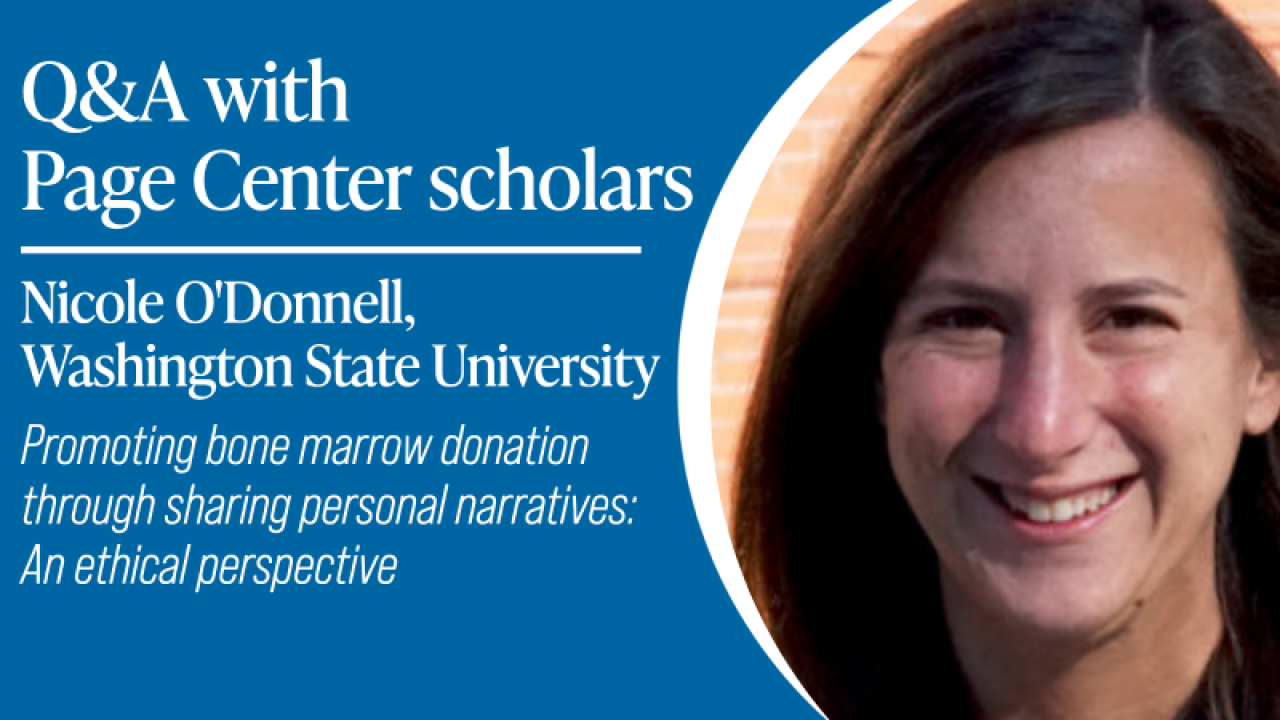May 23, 2023
Role models as health communicators – Scholar Q&A with Nicole O’Donnell

Page Center scholar Nicole O’Donnell, assistant professor at Washington State University, studies the relationship between role models and the people they inspire. She has a particular interest in the health and prosocial behaviors of both groups. O’Donnell has conducted several studies in this area, including one funded by the Page Center in 2021 that viewed CEOs as role models. A recent proposal was funded as part of the Center’s 2023 research call on prosocial communication. That project, which she talks about in this article, will examine the stories bone marrow donors and patients share on social media. O’Donnell hopes the results will provide the building blocks for a guidebook to raise awareness and garner support for donorship effectively and ethically.
What inspired you to start this line of research?
Inspiring people become bone marrow donors. It's really a self-sacrificing altruistic behavior. So, I got interested in it by being inspired myself. I started seeing people share their journeys as a donor or as a cancer patient. As someone who studies role models, that was really impactful. I've become interested in this idea of donors as role models. I analyze how they share their stories to promote a need for bone marrow donors and inspire others to become donors.
Why is it important to study donor/patient communication? What challenges do these groups face?
Let’s say you're being told that you have cancer, and you need to tell your friends and family. How do you navigate that discussion? A lot of people want to go a step further and raise awareness about the type of cancer they have. They can gain support on social media and fundraise and advocate for health care legislation. The challenge is they don't know where to start or how to tell their stories. If we scan social media, we see how these stories are told. Some are done effectively, and at other times people may want guidance for how to share their experiences. I think that practitioners could have a guidebook that shows you how to start and share your story.
From an ethical standpoint, as I was looking into this research, I noticed a lot of really vulnerable children. There were photos of kids hooked up to machines and photos that were exploitative. How do you navigate that as a parent? How do you share the experience, but care about the child's privacy, digital footprint, and other things? In this study, I hope to analyze those issues.
How does one identify ethical guidelines and build a guidebook?
I will be looking toward journalism. I think that journalists have a strong set of ethical guidelines for things along these lines. For them, it's not just children's vulnerable stories in terms of cancer. Journalists handle all different types of issues when showing the experiences of children. They have guidelines for covering migrants, for example. It’s been great to see that strategic communication researchers have strengthened their focus on ethics. A significant portion of this research has emerged from the Page Center, including studies on the Ethics of Care, and I think journalism standards are interesting to integrate with this work.
Can you walk through the two parts of the study?
The first phase of my study is a content analysis. It’s analyzing social media posts that are already out there. I will see what strategies are working and which ones are engaging audiences with likes, shares and comments. I will see the types of photos that are used and compare children’s stories versus adult stories. I want to survey the field of what's currently being done. I also want to gain insight into how we can improve those strategies. For example, I will look at the differences between hope and sorrow appeals.
And for the second phase, I'm going to do a lab experiment. The Media Mind Lab is a psychophysiology lab at the Murrow College of Communications [Washington State University]. We will have participants come in and we will gauge their emotional and cognitive responses to the messages that we show them. I'll be able to show someone multiple messages with different appeals and see how they respond.
A year or two from now, when the project is complete. What do you hope to have in terms of results and plans for next steps?
In addition to academic publications, I hope to have a toolkit developed that works in partnership with community organizations. I want to provide them with a roadmap for how they can communicate these issues with patients. I'm a community engaged scholar, so when I take on a project, I like to work on the issue with a larger organization. I think that it's helpful to provide research driven insights for the industry. In the future, I’m going to keep analyzing this issue, but mostly from the role model and inspirational lens. This study is more patient-centered, and how patients and patient families can share their stories.
What does Page Center support mean to you as a scholar and to this project?
I'm incredibly grateful to the Page Center. The support allows me to bring people into a lab for an hour to an hour and a half. It can be a lot to ask, especially with a psychophysiology experiment. We will be putting sensors on individuals and asking them to share their emotional and cognitive perceptions. I'll be able to pay participants for taking part in the study. I'll also be able to pay for support. It's incredibly rare to have the opportunity to have support and feedback throughout the entire process of conducting a study. Scholars get to work with the Page Center and its advisory board. I absolutely love that. I found it so invaluable when conducting our first study to get feedback before collecting data. It completely strengthens your work.
